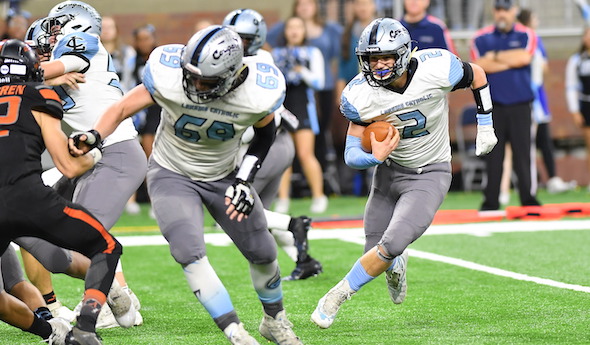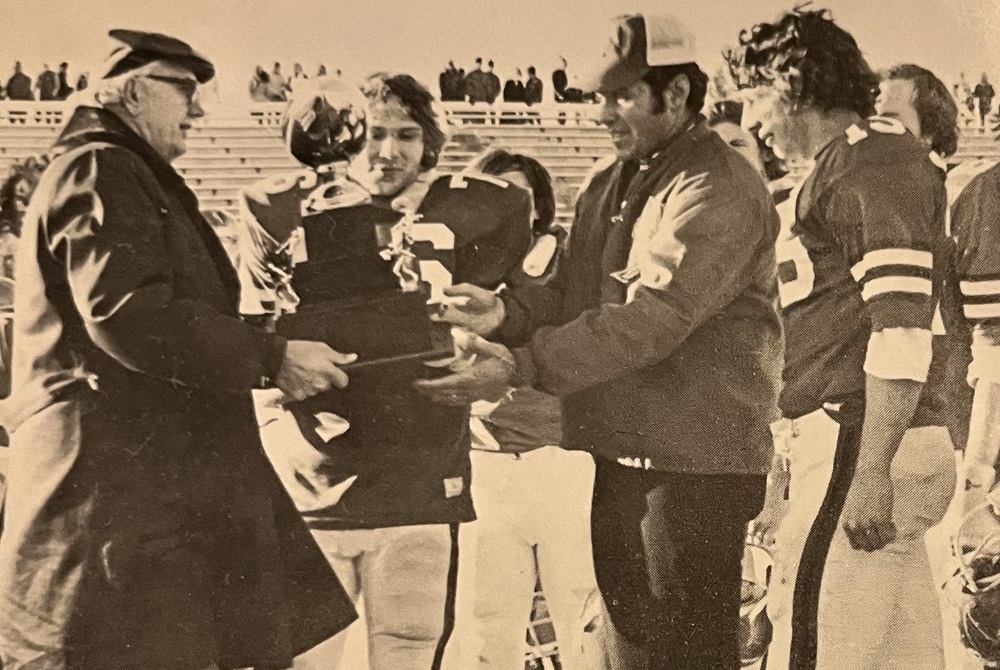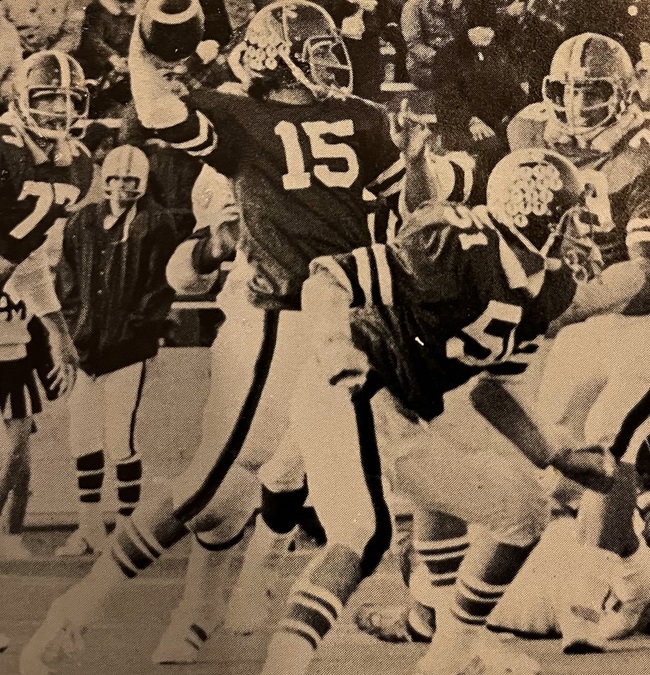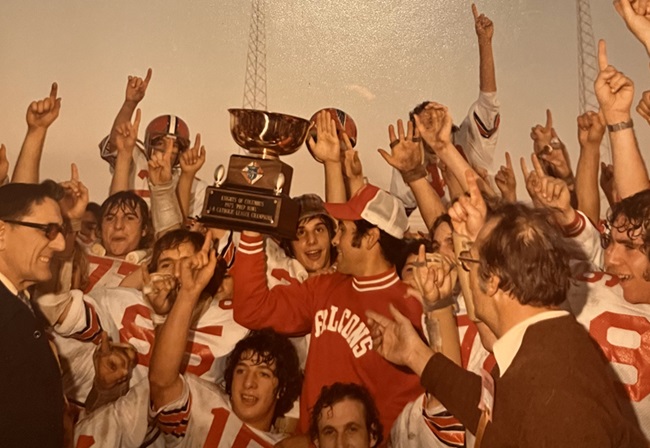
Lansing Catholic Comes Back to Claim D5
November 30, 2019
By Geoff Kimmerly
Second Half editor
DETROIT – Zach Gillespie was just part of what was out of rhythm for Lansing Catholic during the first half of Saturday’s Division 5 Final against Almont.
The senior quarterback headed into the break 2-of-6 passing for 16 yards with an interception, and had eight carries for nine yards – not at all characteristic for a standout who had thrown for nearly 2,500 yards and run for more than 550 through his first 13 games this season.
But somehow, the Cougars and Raiders were tied. And that meant Lansing Catholic was in position to win.
Gillespie stormed back with a big second half, the offense meeting halfway a defense that had kept the Cougars in the game, and the lessons of comebacks earlier this season made the difference in Lansing Catholic finishing a 31-17 win over Almont to earn its first Finals championship since 1985.
“I probably shouldn’t say that with these guys here, but I don’t think this team is the most talented team from top to bottom that we’ve ever had,” said Cougars coach Jim Ahern, who also brought Lansing Catholic to Ford Field in 2011 and 2014. “But I’ll tell ya, I don’t think I’ve had a team that has more chemistry and more heart than this group of kids did. We’ve been behind in a lot of games this year and they never quit, and I think that’s why.”
They call it a “21-7 mentality” and it was born from a loss this season, the sixth-straight over four seasons to rival Portland.
The Cougars (13-1) trailed in that Week 5 matchup 21-7 at halftime, and lightning forced the second half to be played the next day. Lansing Catholic came back to make the final score 21-20 – but even in defeat, the message hit home that the team can change the course of a game over the final two quarters. (And Lansing Catholic went on to defeat Portland 21-0 in the District Final.)
“We write it on the board at halftime – 21-7 mentality in the second half – and I think that was a big turning point coming out firing that game,” Cougars senior linebacker Sam Edwards said. “We’ve just carried that with us since, and it’s made us better.”
This time, as in many before, Gillespie led the way. He found his footing and touch after the break, completing 9-of-17 passes for 171 yards and two touchdowns over the final two quarters and running for two scores as well.
Almont carried a 17-7 lead into the final two minutes of the third quarter. But Lansing Catholic scored 24 unanswered points to finish the game, with Gillespie shutting the door with a four-yard scoring run with 1:39 to play.
That followed touchdown passes of seven yards to senior Vince Salquist and 23 to senior Mitch Raphael, a soccer player last year who showed some delicate footwork getting one down before exiting the side of the end zone. Raphael’s score put the Cougars ahead 24-17 with 3:41 to play.
“We just knew. We knew we could come out and score with anyone,” Gillespie said. “We knew we had a couple three-and-outs, and it wasn’t going our way. We kinda just had all gas, no brakes, and weren’t just satisfied with going up seven there. We wanted to score again.
 “I don’t think I could’ve had a worse first half. Especially in the state championship game, I went in at halftime and I was pretty down on myself. I (restored) the confidence in myself that I can make the throws, and I’ve got great playmakers that are going to catch it. Our line blocked pretty good in the second half … and everyone just got open for me and I was able to deliver.”
“I don’t think I could’ve had a worse first half. Especially in the state championship game, I went in at halftime and I was pretty down on myself. I (restored) the confidence in myself that I can make the throws, and I’ve got great playmakers that are going to catch it. Our line blocked pretty good in the second half … and everyone just got open for me and I was able to deliver.”
Almont (13-1) was making its first trip to the Finals for football, concluding an impressive run that saw it win on the road three of the first four weeks of the playoffs.
But the first half Saturday was frustrating, as the Raiders ended two drives throwing interceptions and a third giving up a fumble. The only first-half possession that didn’t end in a turnover finished with a touchdown.
Almont then scored on a field goal and touchdown on the first two possessions of the second half. But the Raiders threw another interception and fumbled the ball away again on the next two, allowing Lansing Catholic opportunities to catch up.
Senior Jack Paupert and junior Michael Lulgjuraj scored those Almont touchdowns, and Paupert ran 18 times for a team-high 78 yards. Senior Colby Schapman caught five passes for 80 yards. Senior Ryan Miller booted a 31-yard field goal to round out the team’s scoring.
Senior linebacker Jacob Hausmann with seven tackles led a defense that again this season measured up with the state’s best. The Raiders gave up just 11.6 points per game, holding teams below 15 per game for the sixth time in seven seasons. Lansing Catholic’s 31 points were the most surrendered by the Raiders since the 2017 playoffs.
“The backbone of our team is our defense. Coach (Ritchie) Feys does an excellent job preparing these guys, and these guys execut(e) the game plan,” Almont coach James Leusby said. “When we came out (after halftime) we were 0-0 ballgame, and we were going after it.”
Sophomore Alex Watters caught five passes for 107 yards for Lansing Catholic as Gillespie finished with 187 total through the air. Edwards had 19 tackles, recovered both fumbles and snagged an interception, and senior Daniel Magaway had 10 tackles as the Cougars locked down an offense that averaged 39.5 points this fall. Ahern directed the credit to assistants Kelly Carrier, Mike Doran and Pat Barner, who handle all of the defensive play-calling and made adjustments at halftime to slow down Almont’s outside running attack.
Ahern, meanwhile, claimed his first championship five decades after he began his head coaching career at Gobles in 1969. He spent more than three decades at Ithaca and came back from Florida in 2009 to take over at Lansing Catholic – going over 300 career wins this season and moving up to 11th on the in-state career list with a 301-152-6 record while coaching at those three Michigan high schools.
“When you get here and you don’t win, you don’t realize until I think months after that you had a great season. This is definitely a different feeling,” Ahern said.
“The message all week was let’s get him to 301,” Edwards said. “It means the world to me to be able to put on the jersey and play for this guy. It’s kinda bittersweet that I won’t get to do it again, but to end it on a high – there’s no one that deserves this more than this guy right here.”
PHOTOS: (Top) Lansing Catholic quarterback Zach Gillespie follows his blockers during Saturday’s Division 5 Final. (Middle) Mitch Raphael (7) helps bring down Almont’s Michael Lulgjuraj.

'Refuse to Lose' Divine Child Set Tone for Teams to Come with 1st Class B Title
By
Brad Emons
Special for MHSAA.com
November 15, 2024
There was no more conjecture, no newspaper or Associated Press polls to determine the state football champions.
The champion was no longer decided on paper, but out on the field as the MHSAA launched its first playoff tournament in 1975.
Only 16 total teams over four classes were invited to the dance.
And a school with an already a rich football heritage in Dearborn Divine Child proved it on the field with a 21-0 win over Saginaw MacArthur in the Class B title game before 4,000 fans at Central Michigan University’s Perry Shorts Stadium in Mount Pleasant.
In the Semifinals, MacArthur had outlasted Flint Ainsworth, 44-38, as senior halfback Mark Neiderquill rushed for 285 yards and four touchdowns, while Divine Child ousted Sturgis, 20-3.
In the frigid championship final on Nov. 22, the Falcons’ defense held MacArthur’s high-octane offense to seven first downs and 74 yards rushing. They caused three turnovers, with two fumble recoveries and an interception leading to all three of their TDs.
“I thought we could move the ball, but MacArthur was tough,” DC coach Bob LaPointe told the Detroit Free Press.
In the second quarter, Pat Doyle returned an interception 28 yards for a TD, and Mike Surmacz added the PAT for a 7-0 Divine Child advantage.
 “That first interception really got us rolling,” LaPointe said. “Doyle can run the 40 in 4.9 and speed is what made that touchdown. But he got good blocking, too.”
“That first interception really got us rolling,” LaPointe said. “Doyle can run the 40 in 4.9 and speed is what made that touchdown. But he got good blocking, too.”
Two minutes later, Mike Wiacek gave DC another scoring opportunity when he recovered a MacArthur fumble at the Generals’ 24. Nine plays later, senior quarterback Dan Faletti swept right end and scored on a three-yard bootleg for a 14-0 lead.
“The big thing is that they had a good running back that we had to make sure we kept under control,” said Faletti, who went on to play at Eastern Michigan University before a neck injury prematurely ended his career as a sophomore. “We pretty much got the lead, and Bob was conservative. I just remember scoring that touchdown, and my picture made the paper the next day.”
Neither team could move the ball in the third quarter. There were no first downs.
All-stater Mike Svihra then picked up a fumbled lateral in the fourth quarter and ran 10 yards for the game’s final TD.
“It was not a lot of offense; it was a bitter, cold day,” said Faletti, who went on to work for the Department of Defense for 20 years and Ford Motor Co. before recently retiring. “Bob LaPointe ran a conservative offense. We did ball-control, we didn’t put tons of points on the board ... we didn’t fumble the ball. We didn’t throw interceptions.”
The game, ironically, was played on AstroTurf, not on real grass.
“Everyone makes a bit deal of it, but there really isn’t that much difference,” LaPointe added afterwards. “The only thing I regretted about this game was that I could dress only 44 of my 56 players under the rules. It was tough (to) tell the other 12 they couldn’t suit up.”
An 18-12 loss to Madison Heights Bishop Foley during the final regular-season game, spoiling what would have been an undefeated season in 1974, had left the Falcons distraught – but even more galvanized as they made preparations for the 1975 campaign.
The Falcons also changed their offense in 1975, switching to a triple-option attack that LaPointe got from Notre Dame. The offense proved to be good enough for a 9-0 regular season and an MHSAA playoff berth.
“We were an underdog the whole thing, the whole time, we were the underdog in every big game we played in, but we didn’t allow people to beat us,” said Wes Wishart, who coached the linebackers and offensive line that season before taking over the head coaching reins for the Falcons from 1978-95. “We refused to lose, and that was the motto. From ’74 on those group of kids said, ‘We refuse to lose.’ You use that phrase as a coach all the time, but this group of kids lived it. They were the ones that invented it. When things got tight, ‘refuse, refuse, refuse.’ We’re not backing off from anybody. Great group of young men, great players.”
 During the regular season, DC earned victories over highly-touted Flint Powers Catholic (20-14), previously unbeaten Southgate Aquinas (26-12) and Allen Park Cabrini (12-8).
During the regular season, DC earned victories over highly-touted Flint Powers Catholic (20-14), previously unbeaten Southgate Aquinas (26-12) and Allen Park Cabrini (12-8).
That set up a Catholic League Prep Bowl showdown in the final game of the regular season against highly-touted 8-0 Birmingham Brother Rice, which was ranked No. 1 in the final regular-season AP Class A poll.
Although the Falcons were a decided underdog, the AA division champs upended Rice, 7-0, before a packed crowd at Eastern Michigan University’s Rynearson Stadium to snap the Warriors’ 22-game winning streak thanks to Jim Kempinski’s fumble return for a seven-yard touchdown as he snagged the ball in mid-air and never broke stride while crossing into the end zone.
“We played our butts off,” Faletti said. “It was a dog-eat-dog game.”
It was DC’s 11th Catholic League title, but more importantly put the Falcons into the first MHSAA Playoffs against Sturgis in a Semifinal match at C.W. Post Field in Battle Creek.
“I remember everything was brand new; nobody knew what they were doing,” said Wishart, who guided the Falcons to the 1985 Class A crown as their head coach. “Coach LaPointe on Monday had to get the school to get our hotel rooms in Battle Creek.”
Steve Toepper booted a 27-yard field goal for Sturgis to open the scoring, but DC responded with 20 unanswered points.
In the final quarter, DC’s Rick Rogowski scored on a seven-yard run with 9:23 left (after Steve Savini recovered a fumble caused by Joe Wiercioch) followed by a 10-yard TD run by Faletti with only six minutes to go (after Svihra recovered a fumble).
That sent the Falcons into the Final at CMU, where their defense suffocated MacArthur (9-2).
“We kind of ran a special outside zone. We had to quickly change (how) we would defend that. We shut them down,” said Wishart, who spent 50 years in CYO and high school coaching before retiring to live in New York. “There was no doubt, we were more physical than they were. We were blue collar kids. Typical Divine Child kids, hard-working, never give up.
“We believed desperately in defending Divine Child at all costs because we were a smaller school, so we had an attitude that still lingers there today that we all cultivated. We were going to be a physical squad.”
Meanwhile, what made the Falcons special and unique that title season was their “one for all and all for one” attitude.
“Everybody was the same,” Faletti said. “When we went between the lines, we were all equal. As captain, I got to be command as quarterback in the huddle. But off the field we were all equal. We played like 22 seniors. We were ready for this game.”
PHOTOS (Top) Dearborn Divine Child coaches and players receive the Class B championship trophy after winning the inaugural title game in 1975. (Middle) Falcons quarterback Dan Faletti throws a pass during the Final. (Below) Divine Child players and coaches raise their Prep Bowl trophy in celebration. (Championship game photos courtesy of Dearborn Divine Child yearbook. Prep Bowl photo provided by Dan Faletti.)

